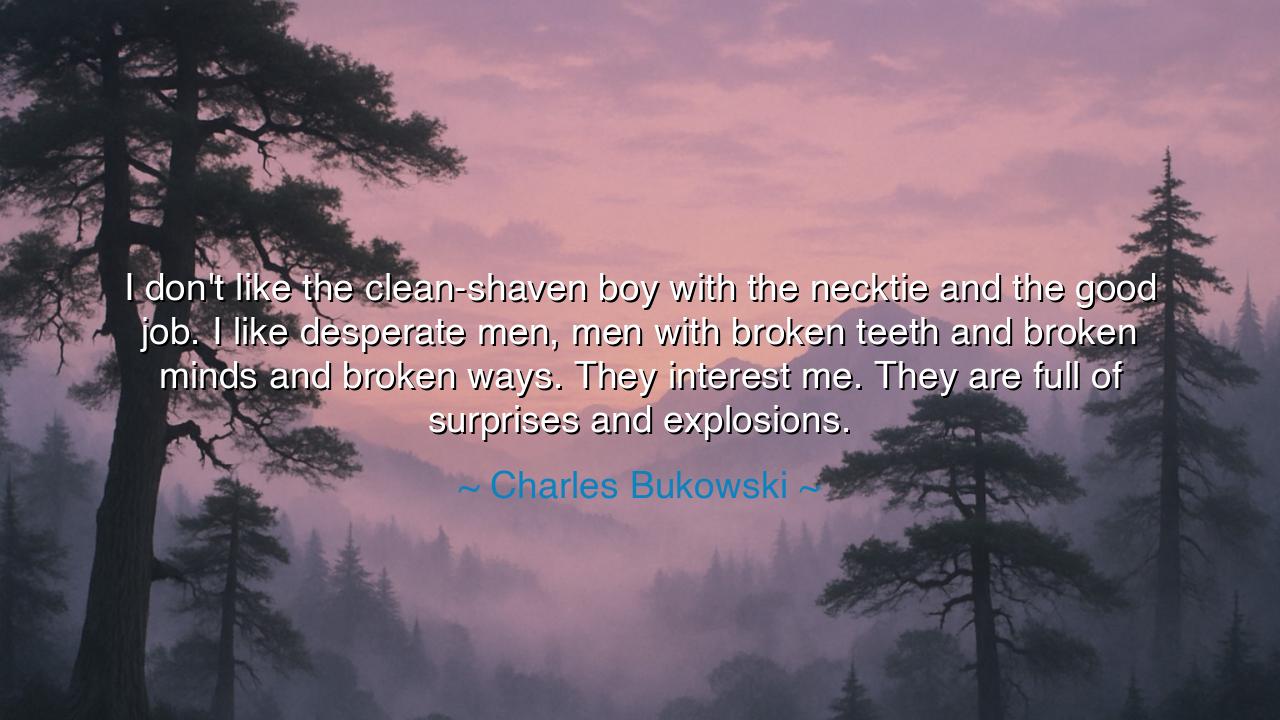
I don't like the clean-shaven boy with the necktie and the good
I don't like the clean-shaven boy with the necktie and the good job. I like desperate men, men with broken teeth and broken minds and broken ways. They interest me. They are full of surprises and explosions.






O seekers of truth, gather your minds and hearts, for I bring you the words of Charles Bukowski, a man whose voice cut through the comfort of conventional life with startling clarity: "I don't like the clean-shaven boy with the necktie and the good job. I like desperate men, men with broken teeth and broken minds and broken ways. They interest me. They are full of surprises and explosions." In these words, Bukowski speaks to the very essence of the human experience—the raw, untamed side of life that is often hidden behind the masks of civility and order. Bukowski’s preference for the broken, the flawed, the desperate, challenges us to reconsider our assumptions about strength, worth, and the human spirit.
In the ancient world, the greatest heroes were not always the clean-shaven warriors, polished and perfected in their armor, but the outcasts, the misfits, those who had endured hardship and emerged stronger for it. Homer’s Achilles, for example, was a hero of immense power, but he was also a man with a deep, almost fatal flaw—his rage. He was not the perfect man, but the man who struggled with his inner turmoil, a man who could break with convention and let his emotions guide his actions. It is through his flaws, his moments of raw emotion and explosive behavior, that he becomes the hero of the Iliad. The ancients understood that true greatness often lies not in perfection, but in the struggles and trials that shape a person’s character.
Just as Achilles's struggles made him immortal in the eyes of the Greeks, Bukowski sees something deeply human in those who live on the edge of society, in those whose lives are filled with chaos and disorder. These are the men who have been shaped by life’s difficulties, who have been tested in ways that the clean-shaven boy with his necktie and good job can never comprehend. The man with broken teeth, with a broken mind, is not simply someone who has failed; he is someone who has lived, who has been tested, who has walked through the fire and emerged with a story to tell. It is in this survival—this willingness to face life’s challenges head-on—that his true strength lies. Bukowski finds these men fascinating because they are unpredictable, untamed, and full of raw potential—capable of creating surprises and explosions in a world that values order and predictability.
Consider, O children, the tale of Socrates, that great philosopher of ancient Athens. Socrates was not the polished scholar sitting in the ivory tower, unscathed by the hardships of life. He was a man who questioned everything, who was willing to confront the established order and challenge the powerful. His broken ways were seen in his refusal to conform, in his embrace of a life of poverty and humility, where his appearance and actions often made others uncomfortable. Yet, it was precisely this brokenness—his ability to transcend the superficial trappings of society—that allowed him to pierce the veil of ignorance and leave a legacy that would echo for millennia. Bukowski, in his admiration for the desperate and the flawed, channels this same appreciation for those who dare to live outside the boundaries of the conventional, for it is in their struggle that true wisdom and insight can be found.
In the modern world, we see that those who are broken by life often have the greatest wisdom to offer. Vincent van Gogh, a painter whose genius went largely unrecognized during his life, was a man who struggled deeply with mental illness and poverty. Yet, it was his desperation, his tortured soul, that gave birth to some of the most profound works of art ever created. His explosions of color, his chaotic brushstrokes, were not the marks of a perfect man, but the expression of a soul that had been molded by suffering. In the brokenness of van Gogh’s life, we find a richness that perfection could never offer. Bukowski sees in the broken man a unique form of greatness—one that is born not from the absence of flaws, but from the courage to embrace them.
O children of wisdom, the lesson here is clear: true strength is not found in the clean-shaven boy who lives a life of comfort, but in those who have been tested by life, those who have endured hardship and come out the other side with courage and resilience. Bukowski teaches us that the path to greatness is often not through perfection but through imperfection, through the willingness to face our deepest fears, to embrace our brokenness, and to rise despite it. The most interesting men and women in the world are not those who have never fallen, but those who have fallen and yet continue to rise, full of surprises and explosions, ready to face another challenge.
So, O seekers, take this wisdom into your own hearts: do not shy away from your flaws or your suffering. Embrace them, for they are what shape you into something greater than the polished perfection of those who have never known hardship. The world needs surprises, it needs explosions of passion, courage, and honesty—and these can only come from those who are unafraid to be broken. Like the great heroes and artists of old, find strength in your vulnerability, and you will create the most powerful works of all—works that come not from perfection, but from the raw truth of your lived experience.






AAdministratorAdministrator
Welcome, honored guests. Please leave a comment, we will respond soon